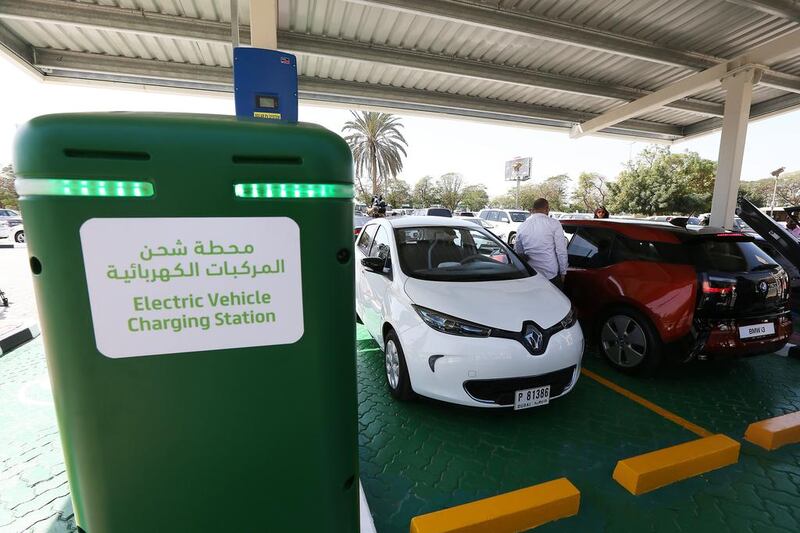ABU DHABI // Electric and hybrid vehicles would be adopted faster if there were government subsidies, the right charging infrastructure and a well-developed battery technology, experts have said.
A desire to improve air quality and protect the environment by reducing greenhouse gas emissions is the motivation for governments in the region to adopt such vehicles, said Akin Adamson, the Middle East regional director at British consultancy Transport Research Laboratory.
“There are a number of challenges that need to be overcome before we see mainstream adoption of electric vehicles in the UAE,” he said.
“[Electric] vehicles are currently too expensive unless supported by government subsidies, so pricing needs to reduce significantly. This could, for example, be considered alongside discouraging the use of more polluting vehicles.”
Ultra-low emission vehicles provide an attractive option for reducing pollution and improving air quality, said Mr Adamson.
“For private vehicles, plug-in hybrids are a good alternative that deliver clean driving in cities over relatively short journeys, and are able to undertake longer journeys in hybrid mode,” he said. The UAE has launched a raft of initiatives to boost the use of electric and hybrid cars as part of its efforts to support a green economy and sustainable development.
Dubai Electric and Water Authority has installed 100 electric-vehicle charging stations so far, its chief Saeed Al Tayer told the World Government Summit last month.
“We need to ensure that we have the right type of charging infrastructure in the right locations and in the right quantities,” Mr Adamson said.
Dubai's Roads and Transport Authority had also announced that half the emirate's cabs would be hybrid cars by 2021.
Toyota's Camry hybrid vehicles are being used by Cars Taxi in Dubai and Abu Dhabi, and Taxi regulator TransAD, in partnership with Cars Taxi and Al Futtaim Motors, added 55 new hybrid to its fleet in 2014.
Last month, the Department of Transport in Abu Dhabi opened a high-tech car park that included recharging points for electric and hybrid vehicles.
Car makers BMW, Lexus and Nissan have hybrid models available here, and fully electric cars are being tested.
Mr Adamson, who is one of the speakers at the three-day Solar Middle East event in Dubai that begins on Tuesday, said these were “steps in the right direction”.
Regulations should be in place to ensure there are adequate measures to validate electric vehicles’ performance and emissions, crash worthiness and maintenance, he said.
An overriding concern is that the range — the distance covered by a fully charged battery — of an electric vehicle is not high enough.
A combination of a well-thought-out charging infrastructure and encouraging the use of vehicles with a longer range is needed.
“Battery technology is still not developed to compare favourably with conventionally powered vehicles,” Mr Adamson said.
“There is also the matter of air-conditioning that is an added drain on electric vehicle batteries, and battery performance in general, in very hot operating environments.”
However, Saif binAdhed, an Emirati who owns two Nissan Patrols, an Acura NSX, a Lexus SC300 and a BMW Z4, does not see himself buying an eco-friendly electric car anytime soon.
“Electric cars are overpriced and the electric car that I’m looking for is not available here,” he said.
“Why will I buy an overpriced car just because it’s electric? Fuel prices are dropping every month so why bother switching to an electric car? Also, many are concerned about the charging time.”
A charge can take between 2 to 4 or 6 to 8 hours. Fast charging stations that will take just 30 minutes to charge will be added at petrol stations in phase two of the project, according to Dewa.
rruiz@thenational.ae






